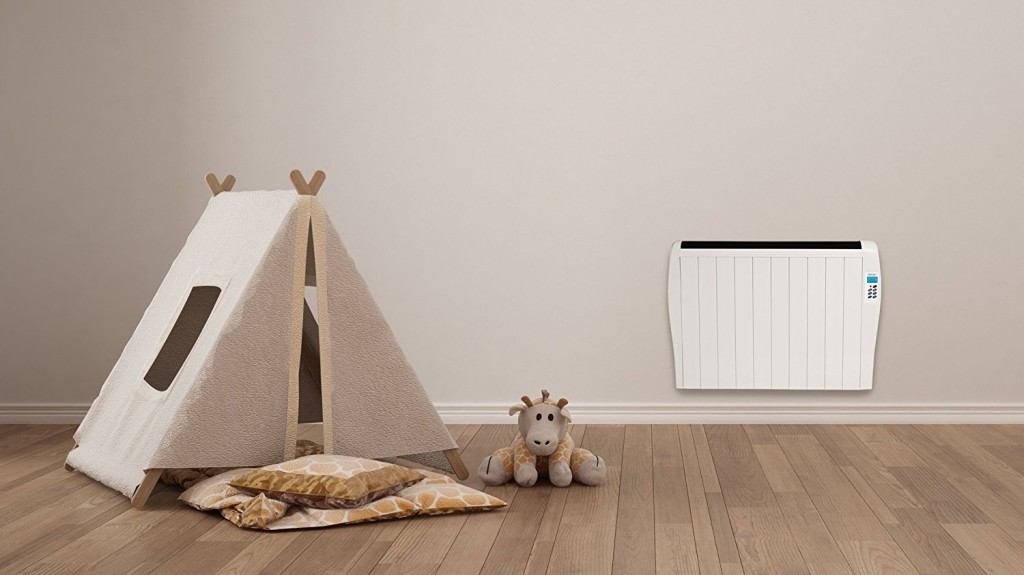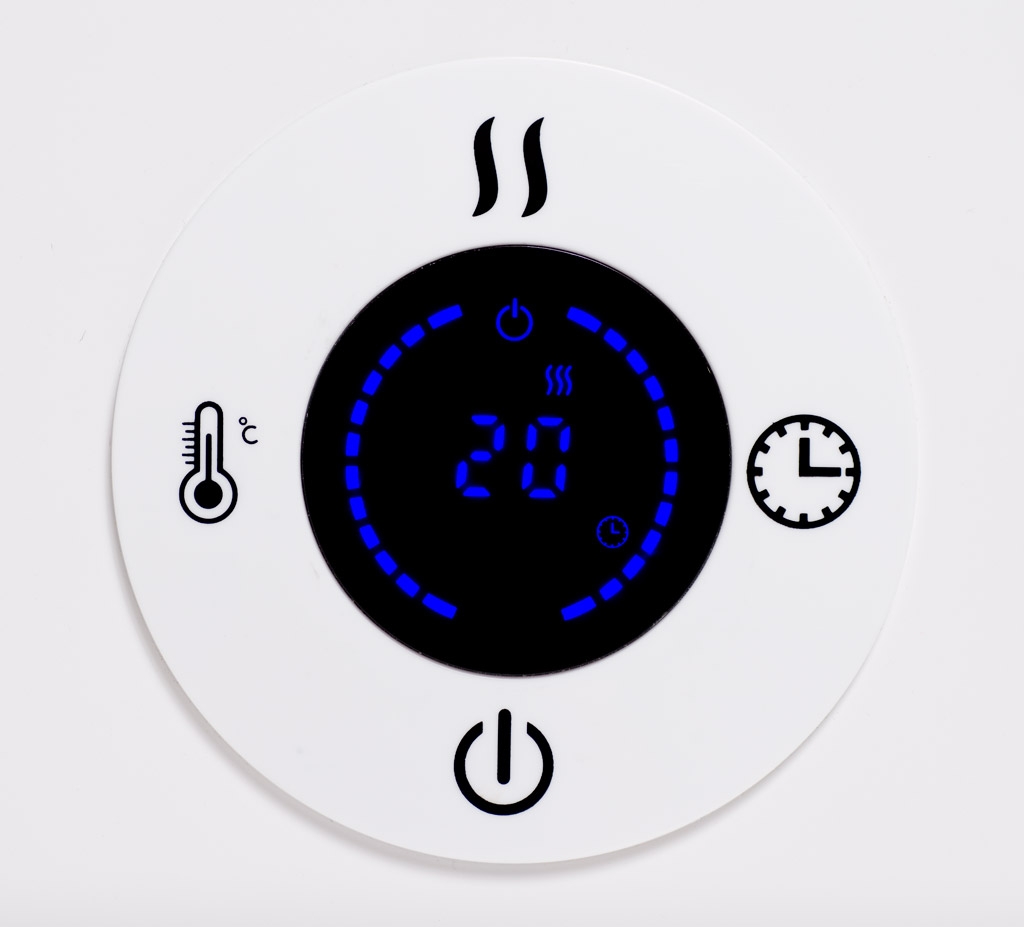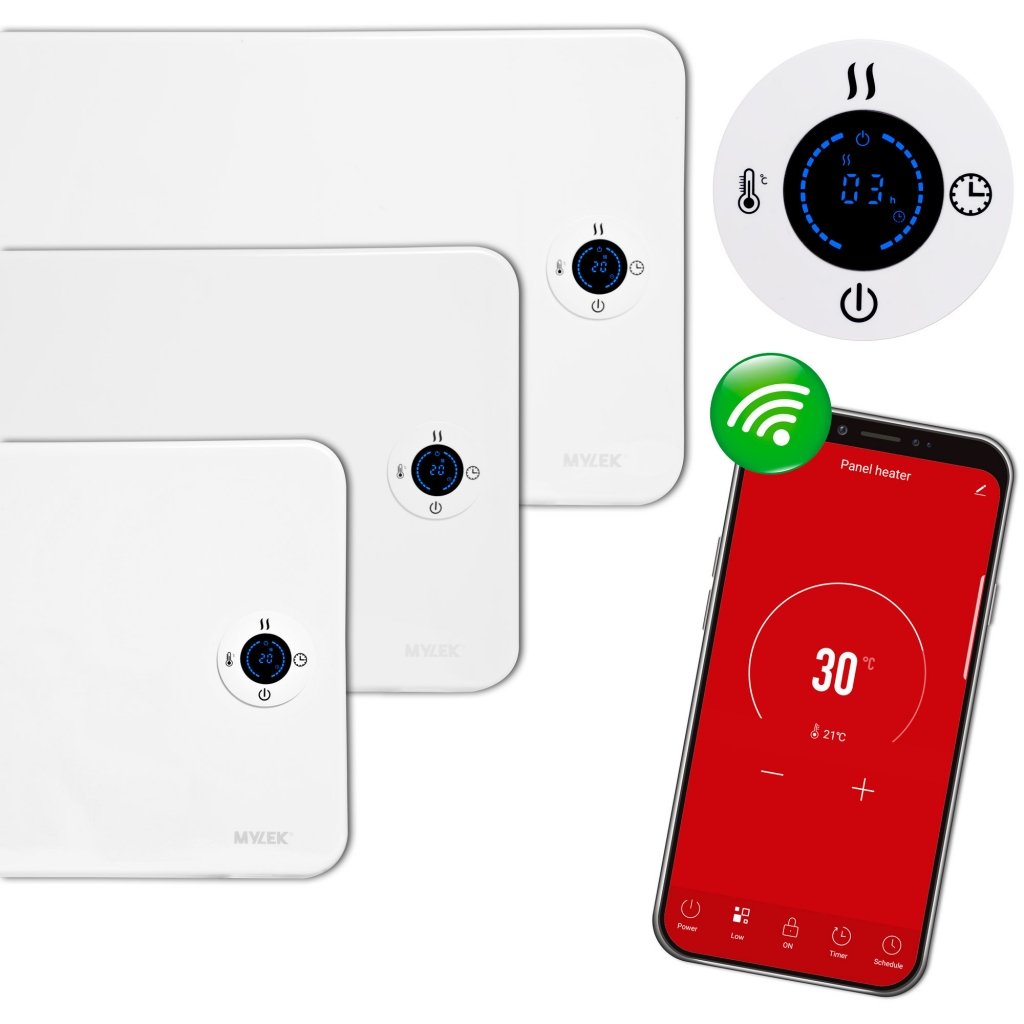
July 17th, 2018 by
Keep Warm and Save Money with an Efficient Panel Heater
 Keep your home cosy for less with an electric panel heater Panel heaters are an energy-efficient way to keep your home warm on a cold day. Often, they can be a better choice than your central heating radiator, which may be old, inefficient, and which probably needs a lot of hot water to stay warm. Getting a modern wall-mounted or free-standing panel heater could actually save you a lot of money as it’ll give you more control over how you heat your home and how much you spend while doing so. The only problem is that there are so many panel heaters out there that it can be hard to know what to look for in a panel heater. With that in mind, we’ve pulled together a list of common questions that you should be asking if you’re looking to upgrade your home’s heating.
Keep your home cosy for less with an electric panel heater Panel heaters are an energy-efficient way to keep your home warm on a cold day. Often, they can be a better choice than your central heating radiator, which may be old, inefficient, and which probably needs a lot of hot water to stay warm. Getting a modern wall-mounted or free-standing panel heater could actually save you a lot of money as it’ll give you more control over how you heat your home and how much you spend while doing so. The only problem is that there are so many panel heaters out there that it can be hard to know what to look for in a panel heater. With that in mind, we’ve pulled together a list of common questions that you should be asking if you’re looking to upgrade your home’s heating.
What is a Panel Heater?
A panel heater is just what it sounds like – it’s a small electric heater that looks like a flat panel.
Why Do I Need a Panel Heater?
 Panel heaters are great for quickly warming up sheds and garages, ideal for making an outdoor bar area Panel heaters can be used as an addition or as an alternative to your central heating radiator around the home as they’re usually much cheaper to run and can heat up any room quite quickly. They’re also useful if you’re someone who spends a lot of time in the shed or garage; panel heaters are relatively small and light, and free-standing panel heaters are really easy to move around.
Panel heaters are great for quickly warming up sheds and garages, ideal for making an outdoor bar area Panel heaters can be used as an addition or as an alternative to your central heating radiator around the home as they’re usually much cheaper to run and can heat up any room quite quickly. They’re also useful if you’re someone who spends a lot of time in the shed or garage; panel heaters are relatively small and light, and free-standing panel heaters are really easy to move around.
How Does a Panel Heater Work?
Most panel heaters work by convection. This means they use an electric current to heat up a heating element, which in turn heats up the air around the panel heater. This air is then circulated around the room, either because it’s naturally radiated around the room by the heater, or by a fan inside your panel heater.
What’s Wrong with My Old Heater?
 Thanks to new regulations (read our guide to ERP Lot 20 for more on this), new heaters must now meet certain environmental standards that many old heaters simply don’t. Even if you’re not interested in being green, this does mean that new heaters must use much less electricity than old ones by law and they also have to have a certain number of extra energy-saving features. In the long term, replacing your old heater with a new panel heater will save you a lot of money if you know what you’re looking for!
Thanks to new regulations (read our guide to ERP Lot 20 for more on this), new heaters must now meet certain environmental standards that many old heaters simply don’t. Even if you’re not interested in being green, this does mean that new heaters must use much less electricity than old ones by law and they also have to have a certain number of extra energy-saving features. In the long term, replacing your old heater with a new panel heater will save you a lot of money if you know what you’re looking for!
What Are the Advantages of a Panel Heater?
Panel heaters are usually slim and subtle in design Panel heaters tend to be quite small and flat so you can fit one to your wall easily, even in small rooms like studies. Because of this, panel heaters are really versatile as you can fit them anywhere in reach of a plug socket. They’re so versatile that you don’t always need to fit them to a wall at all; there are many free-standing panel heaters that you can wheel around to anywhere in your home. Panel heaters are also very affordable to buy and, thanks to the massive strides made in panel heating over recent years, cheap to run, too. As most panel heaters are electric, you’ll also find they heat up very quickly and quietly, with no creaking oil or water pipes to worry about.
Are Panel Heaters Waterproof?
If you want to install a panel heater in your bathroom, this is obviously an area of concern. How waterproof panel heaters are can vary dramatically. Many panel heaters are tested to resist water, but it’s always a good idea to double check that your chosen heater has a good IP rating if you’re planning to install it in the bathroom. IP (or Ingress Protection) ratings measure how good an electrical appliance is at keeping out dust and water. You’ll normally see the IP rating measured with two numbers; for example IP34. The first digit (3 in our example) is a measure of how well-protected your appliance is from solid things – for example, fingers or dust. The second digit (in our example: 4) is the one that’s important in this case, as it shows how good your appliance is at keeping out water. You want that second digit to be 3 or higher if you want to install your panel heater in a bathroom. This means the heater is protected against both condensation and water droplets, so as long as you don’t spill a glass of water on it then it’ll be perfectly fine!
What Should I Look for in a Panel Heater?
You want a panel heater that ticks every box we’ve mentioned above; you want it to be energy-efficient, slim and small, and quiet. There are also a few extra energy-saving features that you should consider when looking at panel heaters that we’ll explain below. If you read our guide to Lot 20 legislation, you’ll know that new panel heaters need to have at least two of these features by law. This doesn’t mean every heater you come across will have these features, though; many companies still have old, non-Lot-20-compliant stock that was made before these regulations came into force that they can still sell, so always be sure to double check you’re getting the most for your money.
Panel Heaters with Digital or Mechanical Thermostats
 It doesn't matter if the thermostat is mechanical or digital Many old heaters are limited in how many different heat settings they have. They might have a dial that lets you flip between a few pre-set temperature settings, or it may simply have an on/off switch that blows out one temperature and nothing else. This isn’t that energy-efficient as often you’ll be left with a heater that’s too hot or too cold, so you’re wasting electricity that you don’t need to be using. New panel heaters, on the other hand, have fully programmable thermostats that let you set your heater’s temperature just the way you like it down to the degree. This means you’ll never have to put up with a heater that’s wasting electricity by putting out slightly too much heat, and you won’t have to constantly flip between settings to keep the room temperature comfortable.
It doesn't matter if the thermostat is mechanical or digital Many old heaters are limited in how many different heat settings they have. They might have a dial that lets you flip between a few pre-set temperature settings, or it may simply have an on/off switch that blows out one temperature and nothing else. This isn’t that energy-efficient as often you’ll be left with a heater that’s too hot or too cold, so you’re wasting electricity that you don’t need to be using. New panel heaters, on the other hand, have fully programmable thermostats that let you set your heater’s temperature just the way you like it down to the degree. This means you’ll never have to put up with a heater that’s wasting electricity by putting out slightly too much heat, and you won’t have to constantly flip between settings to keep the room temperature comfortable.
Panel Heaters with Programmable Timers
Programmable timers are a great way to save on electricity bills while keeping your home toasty warm. If you want to come home from work on a winter evening to find your home nice and warm, you’d probably have to leave your old heater on all day, wasting electricity heating an empty home. With a programmable timer, you can set your panel heater to turn on at any time you want, meaning you’ll always be coming home to a warm house without having to pay through the nose for it. This means panel heaters are great to have around the office, too. You can program your panel heater to heat up while your business is open to keep staff and customers warm, and it’ll shut off automatically when you’re closed. Many panel heaters have 24-hour and 7-day timers so you can account for differing weekend hours, too.
Panel Heaters with Open Door and Window Detection
Open door and window detection is a great smart feature that most new panel heaters will have. If your heater has open door and window detection it’ll cut off when it senses a sudden drop in temperature – for example, when you’ve left a window open! There’s no point in paying for the electricity to heat your room if you’re letting the heat escape through open doors and windows, so this handy feature will help you cut down on wasted energy in a big way.
Smart Panel Heaters
 Smart panel heaters give you complete control over the temperature in your room All of these features are great but being able to use them without having to be physically near your panel heater is even better. Smart panel heaters will let you hook your heater up to an app that lets you control it remotely. If the app and heater both use WiFi, like with Mylek’s Smart Panel Heater, you can actually control and program your panel heater from anywhere in the world. This is incredibly useful for monitoring your energy usage while you’re away from home! Some smart panel heaters – again, like the Mylek Smart Panel Hater – can even be linked to Amazon Alexa or Google Chrome for voice control. If you really want to stay on top of your electricity usage, a smart heater is something you should consider.
Smart panel heaters give you complete control over the temperature in your room All of these features are great but being able to use them without having to be physically near your panel heater is even better. Smart panel heaters will let you hook your heater up to an app that lets you control it remotely. If the app and heater both use WiFi, like with Mylek’s Smart Panel Heater, you can actually control and program your panel heater from anywhere in the world. This is incredibly useful for monitoring your energy usage while you’re away from home! Some smart panel heaters – again, like the Mylek Smart Panel Hater – can even be linked to Amazon Alexa or Google Chrome for voice control. If you really want to stay on top of your electricity usage, a smart heater is something you should consider.
What Should My Panel Heater be Made Of?
One final thing to consider when looking for a panel heater is to look at what it’s made of inside and out. Different materials conduct heat differently – some are better, and some are worse, so this is an important thing to consider when looking for an energy-efficient heater. Most panel heater exteriors will be made of aluminium. This is because aluminium conducts heat really well; better than every other metal except copper (which is too heavy and expensive). You’ll struggle to find a heater that isn’t made of aluminium in this day and age though, so that isn’t too much of a concern. What you do need to be aware of is what materials the heater uses to heat up on the inside. All heaters will have a material inside them that they use to retain heat – this could be a ceramic plate, oil, or even sand (although sand-filled heaters are much less common these days). Oil-filled heaters tend to heat up more slowly, which means they do use slightly less energy than most ceramic heaters. This means if you’re looking to keep your central heating costs low and want to heat a smaller room like your kitchen, an oil-filled radiator may be better for you. On the other hand, if you want something that heats up very quickly, consider a ceramic heater. Some ceramic heaters, like the Mylek Smart Panel Heater, actually retain heat so well that just 60 seconds of power is enough to heat a room for a whole hour, so it’s worth doing a bit of research into what’s on the inside of your heater!
Comments
Leave a reply
Your e-mail address will not be published. All fields are required


